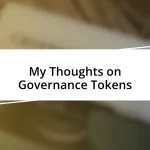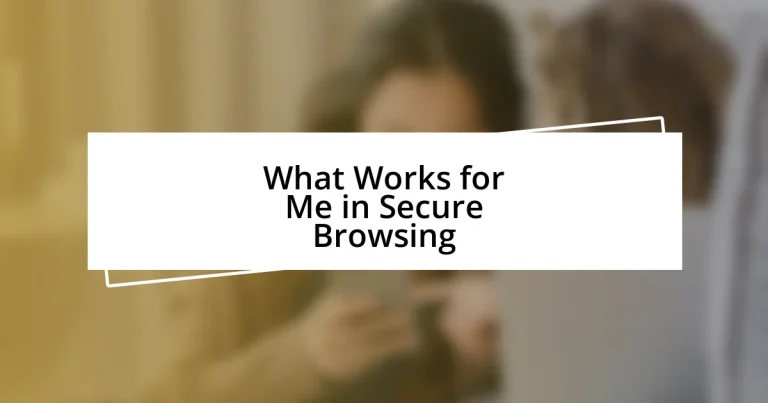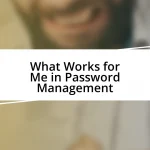Key takeaways:
- Secure browsing is essential to protect personal information and prevent phishing scams; a close examination of links and emails helps identify potential threats.
- Utilizing tools like VPNs, password managers, and browser security extensions significantly enhances online safety and privacy.
- Regularly updating security protocols and adjusting privacy settings empowers users to fortify their digital presence against vulnerabilities.
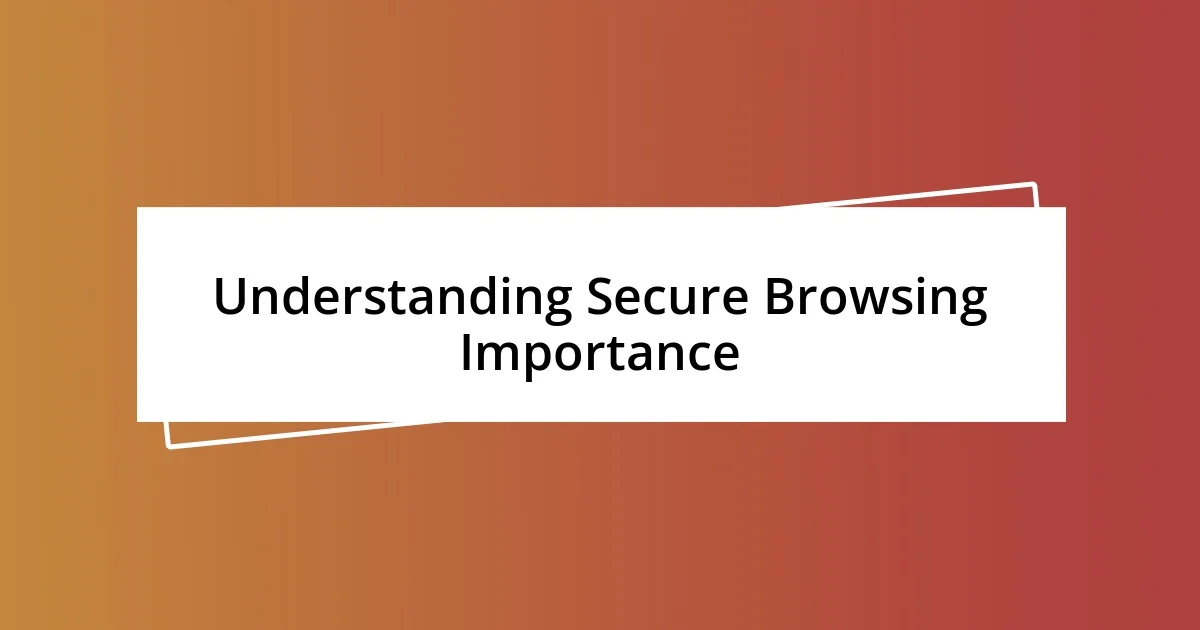
Understanding Secure Browsing Importance
When I think about secure browsing, I can’t help but remember the moment I almost fell victim to a phishing scam. I clicked on what I thought was a legitimate email link, but luckily, I recognized the red flags just in time. This experience reinforced for me just how critical it is to navigate the web safely—one wrong click can lead to compromised personal information.
Secure browsing isn’t just a technical term; it’s about protecting our digital lives. Have you ever considered how much sensitive data we share online? From bank details to personal messages, maintaining security means safeguarding our privacy and preventing identity theft. Being aware of this importance makes me feel more empowered when I’m online.
I remember feeling completely exposed when I learned about the risks associated with using public Wi-Fi. That realization changed how I approach internet connections, making me appreciate tools like VPNs for secure browsing. It’s a lesson many people overlook, but understanding the stakes can truly transform our online experience.
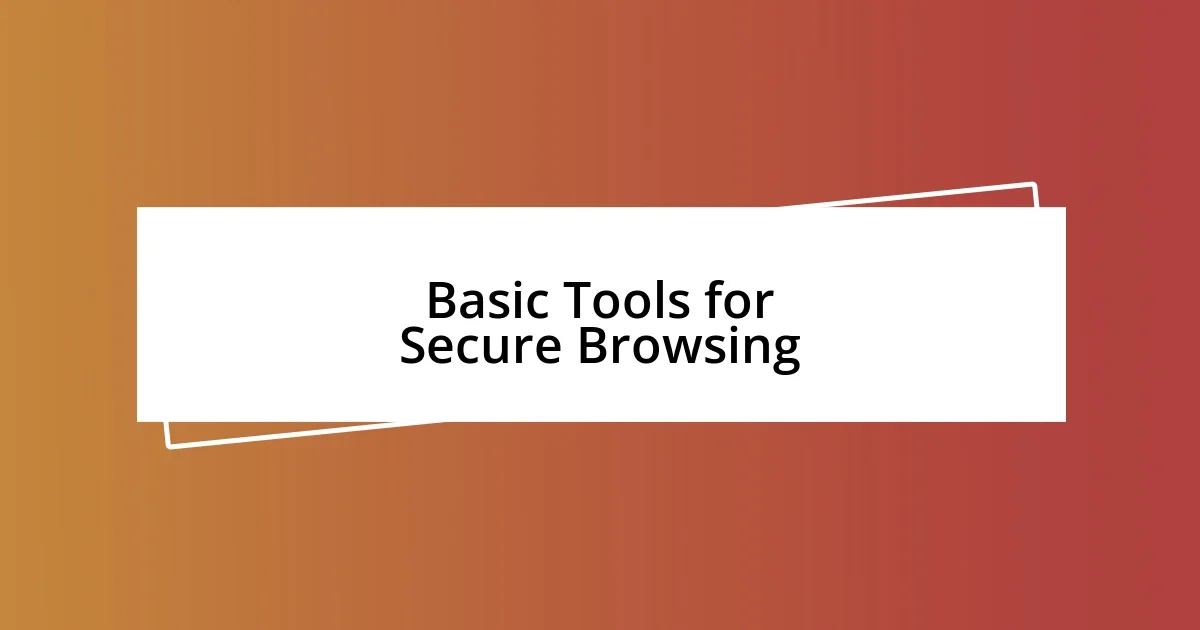
Basic Tools for Secure Browsing
When it comes to secure browsing, the first tool that comes to my mind is a Virtual Private Network (VPN). I recall the first time I used one while traveling; it felt like I was wrapping my online traffic in a cozy blanket. The peace of mind it brought me, knowing my data was encrypted, changed my entire internet experience. It’s incredible how a simple tool can transform your vulnerability into a sense of safety.
Another essential tool is a reliable password manager. The chaos of managing countless passwords used to stress me out. I remember craftily sketching out passwords in notebooks, which was not only inconvenient but risky. When I switched to a password manager, I found relief in its functionality—no more repetitive locks on my accounts due to forgotten passwords. It’s like having a personal vault that keeps my credentials secure and organized.
Lastly, utilizing browser extensions for security can significantly enhance your protection online. I discovered this when I accidentally clicked on a questionable link that tried to install malware on my computer. After that scare, I sought out extensions that block harmful content and provide real-time alerts on phishing threats. It was a game-changer, enhancing my browsing experience and helping me feel more in control of my online safety.
| Tool | Description |
|---|---|
| VPN | Encrypts your internet connection, protecting your data from prying eyes. |
| Password Manager | Stores and manages your passwords securely, allowing for strong, unique passwords for every account. |
| Browser Extensions | Enhances security features such as ad-blocking, tracking prevention, and phishing protection. |
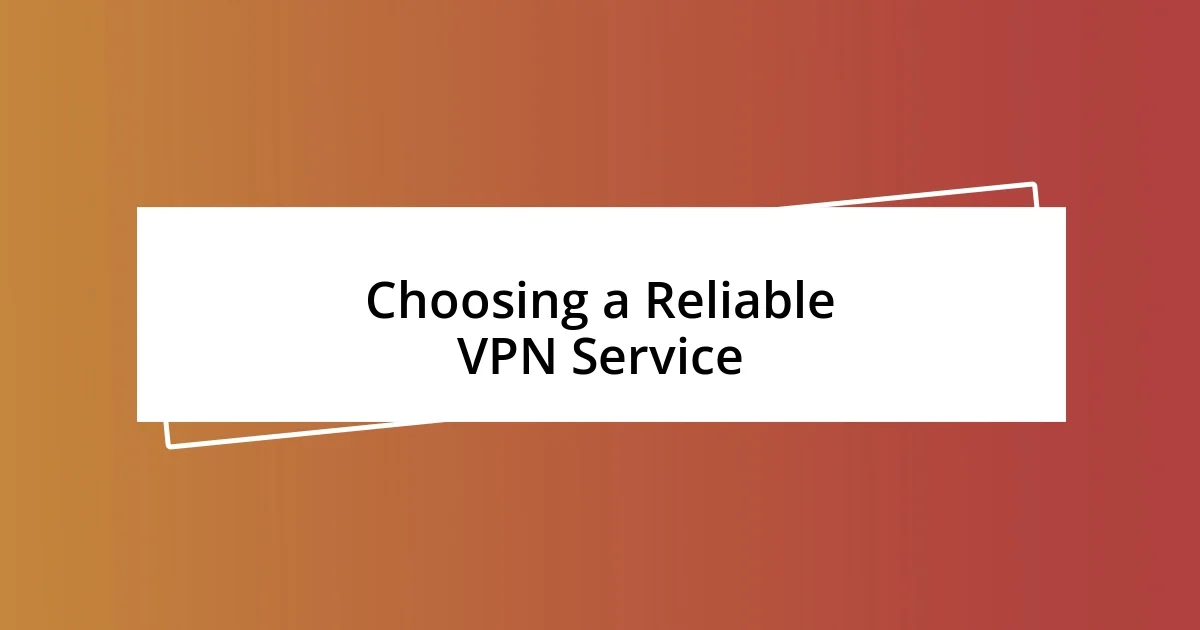
Choosing a Reliable VPN Service
Choosing the right VPN service can be a daunting task, given the overwhelming number of options available. I remember the first time I tried to pick a VPN—my mind was racing with questions, and I felt completely lost in a sea of choices. Ultimately, I learned to focus on a few key features that truly matter: strong encryption, a no-logs policy, and reliable customer support. It’s reassuring to know these factors can significantly enhance my online security and freedom.
Here are some important considerations to keep in mind when choosing a reliable VPN service:
- Strong Encryption: Look for services that offer AES-256 encryption to ensure your data is thoroughly protected.
- No-Logs Policy: A reputable VPN should guarantee that they do not track or log your online activities, preserving your privacy.
- Server Locations: Choose a VPN with a broad network of servers, which allows for better speed and access to geo-restricted content.
- User-Friendly Interface: A simple, intuitive design makes it easier to navigate the service, especially during critical moments.
- Reliable Customer Support: Accessible and knowledgeable support can make all the difference if you run into issues.
In my experience, checking for these components ahead of time has saved me from many potential headaches later.
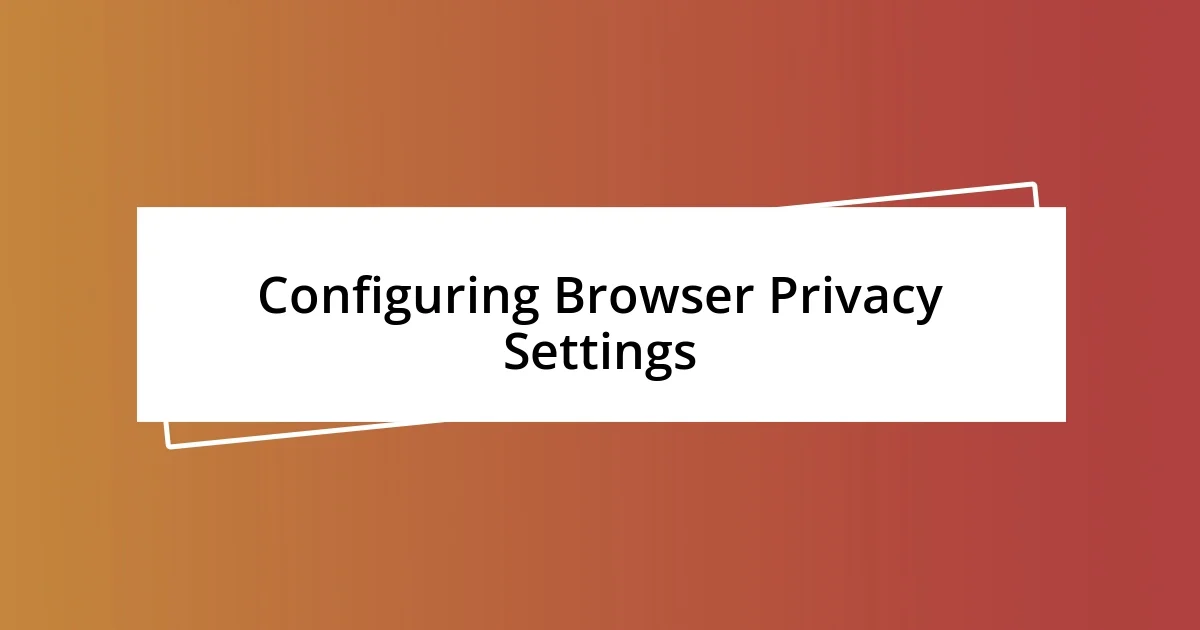
Configuring Browser Privacy Settings
Configuring your browser’s privacy settings is like customizing a security guard for your digital presence. I vividly recall the first time I dived into these settings—it felt a bit like unearthing treasure. Disabling third-party cookies opened my eyes to how much information was being shared without my knowledge. It was surprisingly empowering to take back some control over my online footprint.
I always recommend checking the security and privacy settings upon installing any new browser. In one instance, I switched to a different browser on my laptop and was startled to discover that it defaulted to sending various data back to the company. I spent a few minutes adjusting settings, opting out of data collection features. Those moments made me realize that a little vigilance goes a long way in fortifying my privacy.
Additionally, I learned the importance of using “Do Not Track” features. After enabling this option, I noticed fewer targeted ads which made my browsing less intrusive. It might seem like a small step, but it significantly reduced the feeling of being constantly watched online. Have you ever experienced the discomfort of ads following you around? That’s exactly why tailoring your privacy settings can enhance your browsing comfort. It’s about crafting an online space where you feel safe and respected.
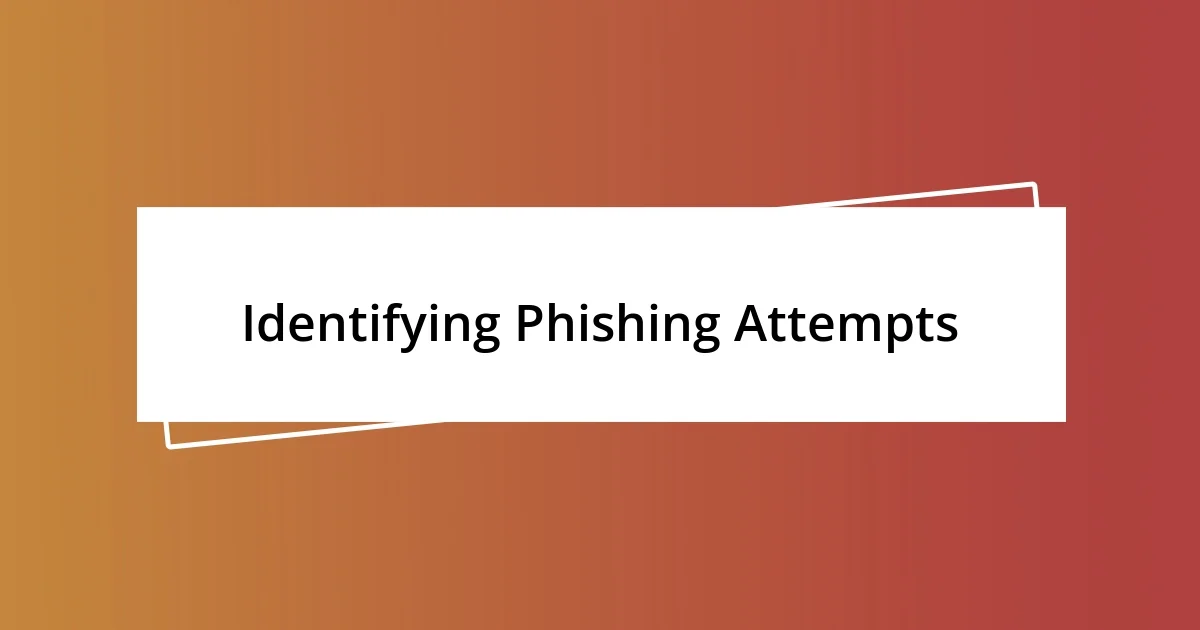
Identifying Phishing Attempts
Identifying phishing attempts requires a blend of awareness and caution. I still vividly remember the moment I almost clicked on what looked like a legitimate email from my bank. The red flag? The email address seemed slightly off, with a missing letter. That experience taught me to scrutinize every detail, from the sender’s address to the language used in the message. Phishing attempts often have poor grammar or an urgent tone pushing you to act without thinking—it’s essential to recognize these traits.
When I encounter unfamiliar links, I take the extra step to hover over them before clicking. This simple action reveals the true destination of a link, which can often be a malformatted web address that triggers my instinct to back away. I once fell for a harmless-looking link in a friend’s message, only to find it led to a sketchy website. It was a wake-up call—trust but verify is now my mantra.
It’s also vital to question unexpected requests for personal information. I clearly remember receiving a text purporting to be from a delivery service, asking for my address confirmation. Something felt off, as I hadn’t placed any recent orders. A quick search revealed it was a common phishing scam. I’m always amazed at how easy it is to stay safe by simply pausing and thinking critically. Have you taken a moment to pause when something seems too good—or too urgent—to be true? That pause might just save you from falling into a phishing trap.
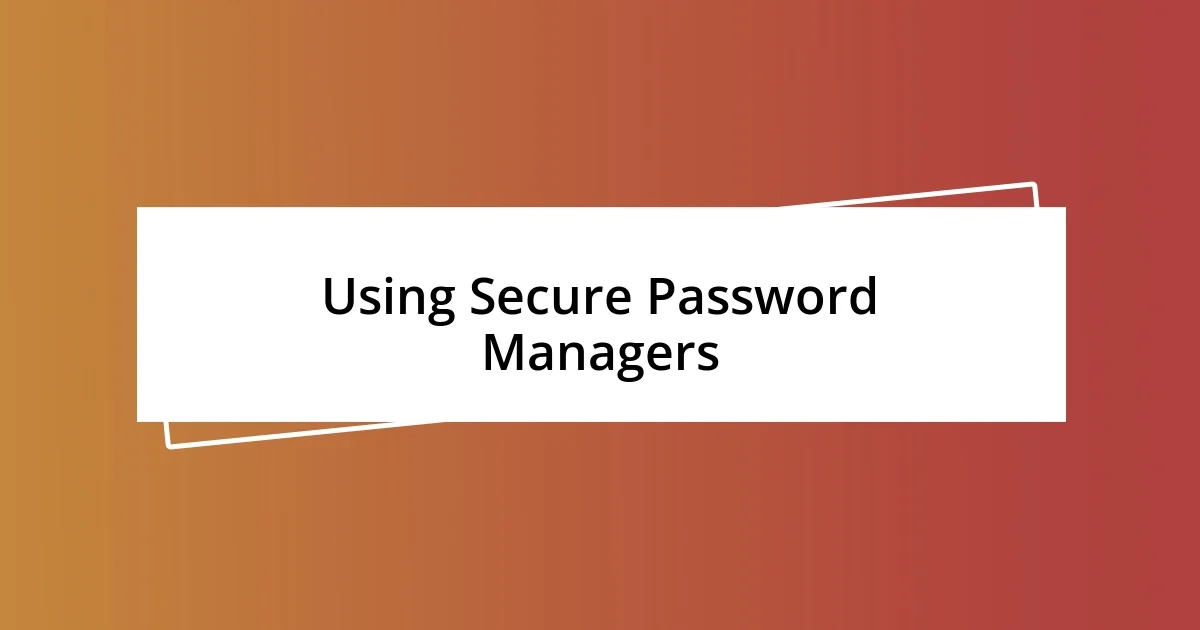
Using Secure Password Managers
Using a secure password manager feels like having a digital vault where I store my most important keys. I remember the days when I juggled multiple complex passwords, trying to remember them without writing them down. What a hassle! Since I started using a password manager, I’ve felt a major weight lift from my shoulders. I love the convenience of auto-filling my login details and, more importantly, knowing that my passwords are encrypted and stored securely. Isn’t it relaxing to have that peace of mind?
One of my most eye-opening experiences was when I learned about the dangers of reusing passwords. A friend of mine faced a headache after their account was compromised due to this mistake. It really hammered home the importance of unique passwords for every site. With a password manager, I can generate strong, random passwords effortlessly. Have you thought about how often you revisit that same password for different accounts? That habit can be risky, but switching to a password manager has made it effortless for me to keep everything secure.
I also appreciate the added layer of security that many password managers offer, like two-factor authentication (2FA). I remember feeling a rush of adrenaline the first time I set it up—my accounts felt dramatically safer. The extra step might seem like a hassle, but the peace of mind is worth it. I often ask myself, “What’s more important? A few extra seconds of login time or protecting my digital life?” The choice is clear for me. Secure password managers have truly transformed the way I approach online security, and I genuinely believe they’re an essential tool for anyone serious about protecting their information.
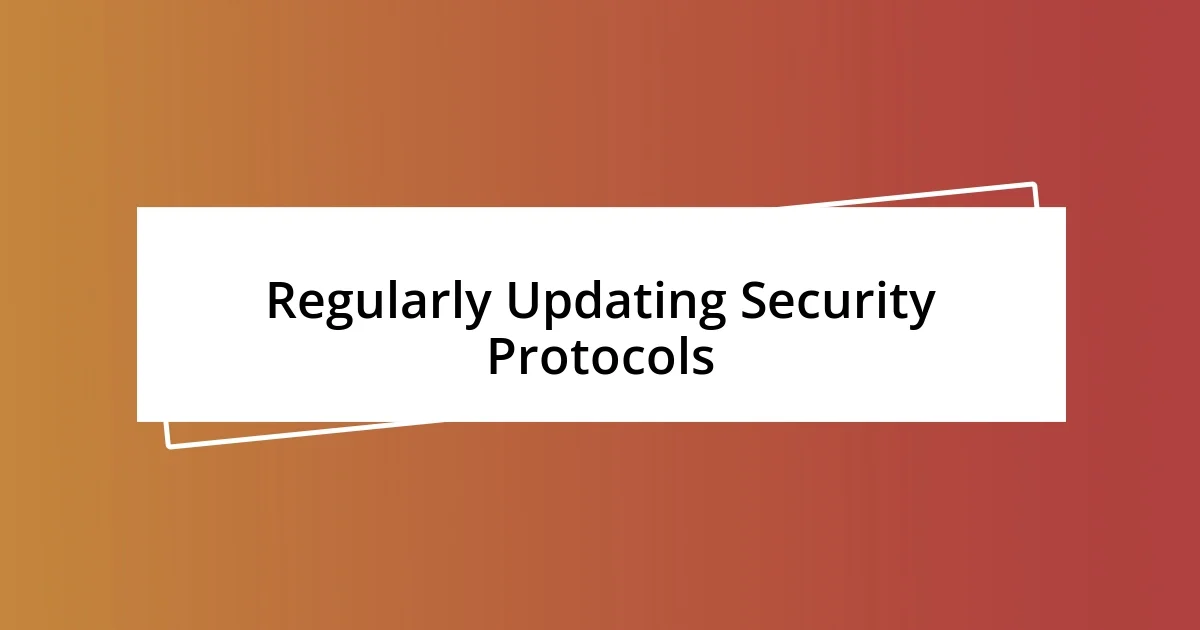
Regularly Updating Security Protocols
Keeping my security protocols updated is something I prioritize regularly—it’s like fine-tuning a well-oiled machine. I still recall the time I postponed an update on my antivirus software, thinking it wasn’t urgent. A few days later, I noticed some sluggishness on my computer. It turned out that I hadn’t just missed a security patch; I exposed myself to potential vulnerabilities. Have you ever experienced that nagging feeling when you know you should update but put it off? I can assure you, a proactive approach is much better.
I’ve made it a habit to check for updates as soon as they become available, even setting reminders on my calendar. The peace of mind that comes with knowing my system is fortified against the latest threats is truly invaluable. Something as simple as a software update can close gaps that hackers exploit. I remember feeling quite proud of myself after updating my browser and discovering features designed to enhance my privacy. It felt rewarding, like I was taking control of my digital space.
Beyond software updates, understanding security settings is crucial too. I once spent an afternoon combing through the privacy settings of my most frequented platforms, only to find numerous options available that I hadn’t even known existed. Each adjustment I made felt like bolstering my defenses. If you haven’t done this in a while, I invite you to dive into your settings. What hidden safeguards might you discover that could enhance your online security? Taking these steps not only protects my information but also empowers me as a digital citizen, and I believe it can do the same for you.






